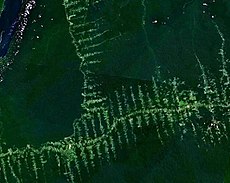This is an old revision of this page, as edited by MrOllie (talk | contribs) at 17:52, 9 September 2011 (Reverted 1 edit by Suchthekaitlin (talk): Rv refspam. (TW)). The present address (URL) is a permanent link to this revision, which may differ significantly from the current revision.
Revision as of 17:52, 9 September 2011 by MrOllie (talk | contribs) (Reverted 1 edit by Suchthekaitlin (talk): Rv refspam. (TW))(diff) ← Previous revision | Latest revision (diff) | Newer revision → (diff)Forest management is the branch of forestry concerned with the overall administrative, economic, legal, and social aspects and with the essentially scientific and technical aspects, especially silviculture, protection, and forest regulation. This includes management for aesthetics, fish, recreation, urban values, water, wilderness, wildlife, wood products, forest genetic resources and other forest resource values. Management can be based on conservation, economics, or a mixture of the two. Techniques include timber extraction, planting and replanting of various species, cutting roads and pathways through forests, and preventing fire.
Public input and awareness
There has been an increased public awareness of natural resource policy, including forest management. Public concern regarding forest management may have shifted from the extraction of timber to the preservation of additional forest resources, including wildlife and old growth forest, protecting biodiversity, watershed management, and recreation. Increased environmental awareness may contribute to an increased public mistrust of forest management professionals.
Many tools like GIS modelling have been developed to improve forest inventory and management planning.
Wildlife considerations
The abundance and diversity of birds, mammals, amphibians and other wildlife are affected by strategies and types of forest management.
See also
- Biodiversity
- Community forestry
- Certified wood
- Conservation biology
- Environmental protection
- Even aged timber management
- Forest farming
- Forest informatics
- Growth and yield modelling
- Habitat conservation
- Healthy Forests Initiative
- Natural environment
- Natural landscape
- Nature
- Outline of forestry
- Overexploitation
- Renewable resource
- Sustainability
- Sustainable development
- Sustainable forest management
- Sustainable forestry
References

- "Glossary of Forestry Terms in British Columbia" (pdf). Ministry of Forests and Range (Canada). 2008-03. Retrieved 2009-04-06.
{{cite web}}: Check date values in:|date=(help) - Shindler, Bruce (1999). "Shifting Public Values for Forest Management: Making Sense of Wicked Problems". Western Journal of Applied Forestry. 14 (1). Society of American Foresters: 28–34. ISSN 0885-6095. Retrieved 2008-08-25.
{{cite journal}}: Cite has empty unknown parameters:|laydate=,|laysource=,|laysummary=, and|quotes=(help); Unknown parameter|coauthors=ignored (|author=suggested) (help); Unknown parameter|month=ignored (help) - Mozgeris, G. (2008) “The continuous field view of representing forest geographically: from cartographic representation towards improved management planning”. S.A.P.I.EN.S. 1 (2)
- * Philip Joseph Burton. 2003. Towards sustainable management of the boreal forest 1039 pages
This article about forestry is a stub. You can help Misplaced Pages by expanding it. |
This sustainability-related article is a stub. You can help Misplaced Pages by expanding it. |